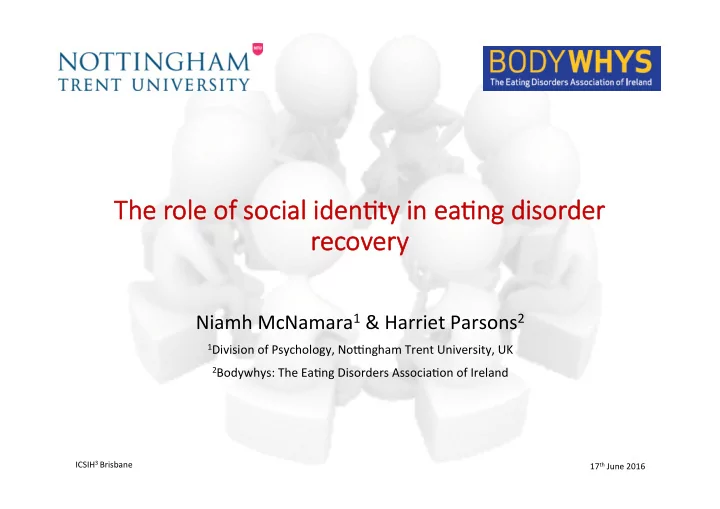

Th The r e rol ole of e of s soci ocial i iden en/ty i in ea ea/ng d disor order er recovery re Niamh McNamara 1 & Harriet Parsons 2 1 Division of Psychology, No;ngham Trent University, UK 2 Bodywhys: The EaDng Disorders AssociaDon of Ireland ICSIH 3 Brisbane 17 th June 2016
Th The E e Ea/ng D Disor order er a as a an Id Iden en/ty GeneraDng feelings of success Overcoming feelings of worthlessness PosiDve disDncDveness Intrapersonal factors Interpersonal factors Reducing feelings of isolaDon Gaining social acceptance SchmiP & Treasure (2006) Maintenance model of Anorexia Nervosa
Recovery me means iden/ty change • Focus remains at individual level • Develop a “more mature personality” in therapy (Abbate-Daga et al., 2013) • Social relaDonships outside of therapy ignored • Role of social idenDty and groups • Focus on maintenance of disorder • ED as “contagious” • Avoid similar others!
Groups, Social Identity & Eating Disorders • Some discussion of SID in ED recovery literature • Increase negaDve associaDons with EDID (Ison & Kent, 2010) • SDgmaDsed idenDDes & ‘Social Curse’ (Stevenson, McNamara & Muldoon, 2014) • There is a gap here…. • Meaning of group membership is important to consider • Further research needed on social idenDty change in mental health recovery
Cu Curren ent S Study y • Aim: • Explore how shared idenDty can promote eaDng disorder recovery • Examining group dynamics in situ • Method & Analysis: • Transcripts of 18 online support group sessions involving 75 users over a 6-month period were themaDcally analysed • Each session lasted 90 minutes • 2 facilitators and average of 7 parDcipants per session 5
“Nobody seems to understand the “ … like it’s a choice we make hold it has over u, they seem to but it’s not – who wud want this” think you are choosing to have the ED.” Getting the ‘right’ support for recovery “ … everyone here wants everyone else to get “ … I don’t want to burst their better, we all understand what everyone is bubble and tell them I’m not okay. But either way they going through and know how difficult it is to won’t understand, they can’t.” talk about it. I think anyone in need of support is in the right place.”
Shared identity fosters positive support experiences “guys it can be done. May take a few “ … we avoid talking about the admissions but I know so many specifics of food & weight & people who have recovered 100%. instead concentrate on the We can’t give up hope. Guys don’t feelings around them. This helps give up.” to include everyone as we believe that the emotions … are the same regardless of which eating disorder it is”
Shared identity fosters positive support experiences “thanks for showing me that we are “Thanks for your help [Lara], and not struggling alone guys.” [Jay], being able to identify with other people helps. And I think this meeting will be a good start for me.” “ … I’ve just been so overwhelmed with everything lately, it’s been difficult, I really wanted to start working on this again though I think I really needed to come here tonight”
Chloe I didnt feel guilt, i just binged cuz I Shared identity couldn’t deal with whatever was going on in my life fosters positive support Ruth […]See i binge [Chloe] cause of experiences things in my life but then feel so guilty after it. you try to not think about the guilt but then your thinking about not thinking about it. How do you feel after a binge [Chloe]? Chloe just felt like shit really and i wanted the food out of my system as fast as possible. When I purged I felt great – id accomplished something. Im actually in recovery [Ruth], counselling will help you. Im just testing this forum tonight, but maybe its not the right group for me.
“Wouldn't be so amazing to “ … I know the pathway is never straightforward and that I should continue to fight, but it feels so wake up and be free from it, desperately unsafe. I realise that it’s all about fear of always wish I could just be losing identity etc but when you put the issues of normal and be like everyone getting fatter on top of that it makes it all so much else” harder … ” Recovery is not a return to normal “I too ask the question, does recovery mean that one day I will be 'normal' with “ … For me its managing to normal eating habits, but I now don’t the best of my ability and believe it will happen. Not to dishearten not to be defined by my anyone.......what I mean is, stop searching illness” for the time when everything will be perfect, and then being hard on yourself for not reaching that perfection.”
Recovery means reaching out to others “I went to my GP in February and told her everything, doctors “ … Recovery is a very long are amazing with keeping things process with lots of up’s and between you and them … .” down’s, you can recover with perseverance and with HELP, I don’t advocate going it alone on recovery at all … ” “ … if you don’t talk to your GP then in my opinion you can’t recover”
Con Concl clusion on • Crucial to self-define as ‘in recovery’ • ConverDng the ‘social curse’ to ‘social cure’ • Harnessing idenDty resources • Next steps: • Connect with other groups? • Barriers to this? • TransiDonal idenDDes (Dingle et al., 2015; Vangeli & West, 2012) 12
Any Qu Ques/ons? niamh.mcnamara@ntu.ac.uk
Recommend
More recommend